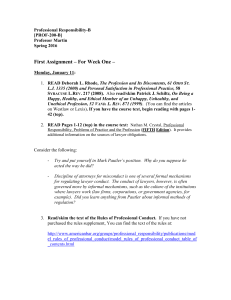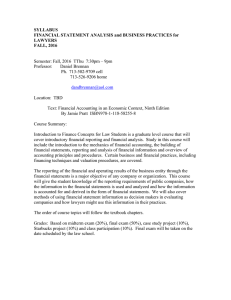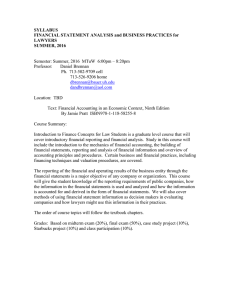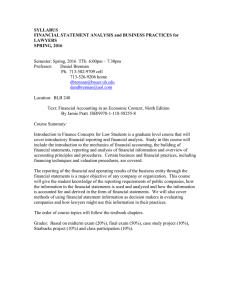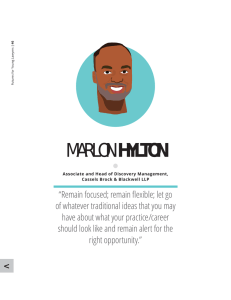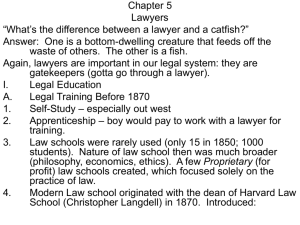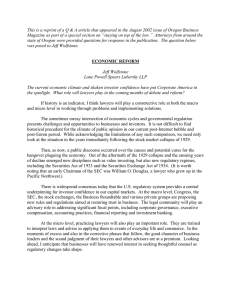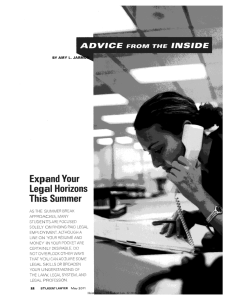Michael S. Greco Immediate Past President, American Bar Association
advertisement
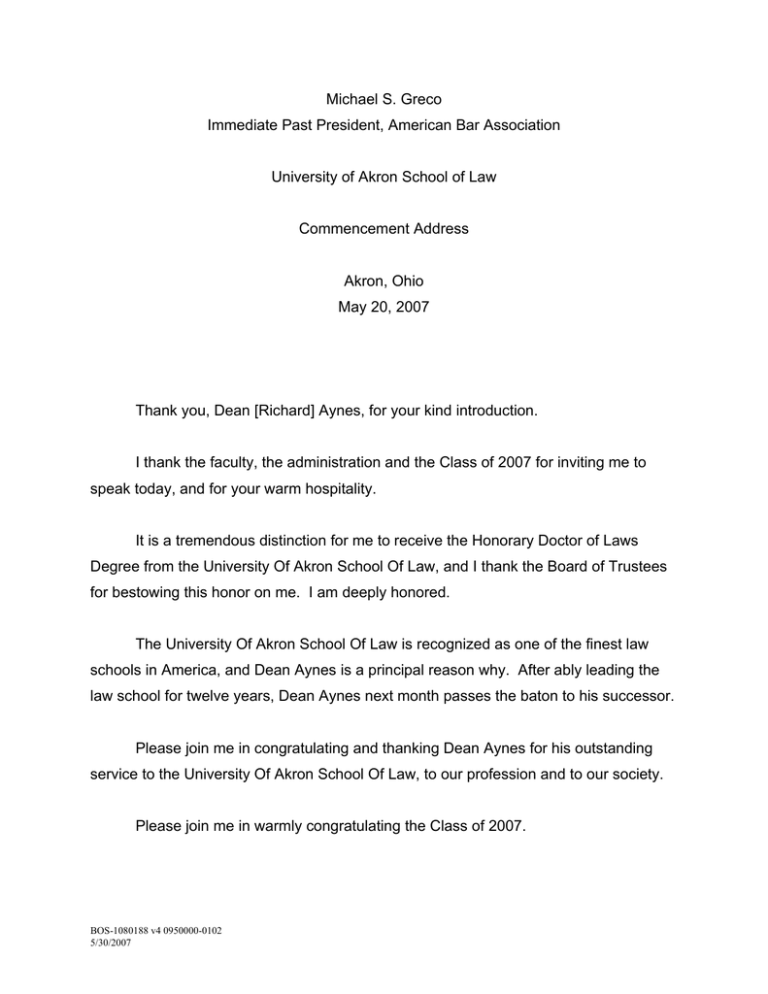
Michael S. Greco Immediate Past President, American Bar Association University of Akron School of Law Commencement Address Akron, Ohio May 20, 2007 Thank you, Dean [Richard] Aynes, for your kind introduction. I thank the faculty, the administration and the Class of 2007 for inviting me to speak today, and for your warm hospitality. It is a tremendous distinction for me to receive the Honorary Doctor of Laws Degree from the University Of Akron School Of Law, and I thank the Board of Trustees for bestowing this honor on me. I am deeply honored. The University Of Akron School Of Law is recognized as one of the finest law schools in America, and Dean Aynes is a principal reason why. After ably leading the law school for twelve years, Dean Aynes next month passes the baton to his successor. Please join me in congratulating and thanking Dean Aynes for his outstanding service to the University Of Akron School Of Law, to our profession and to our society. Please join me in warmly congratulating the Class of 2007. BOS-1080188 v4 0950000-0102 5/30/2007 Now I ask the Class of 2007 to stand and express heartfelt appreciation to family and friends for all the support they have given you for so long. You know that you would not be here without their support. Never forget that. Dean Aynes assures me that you are well prepared for the bar examination, so I will skip my pep talk on that subject, other than to urge you to work as hard as you possibly can to prepare for it. Do not take it for granted. Today you join more than 6,000 alumni of the University Of Akron School Of Law who practice law throughout the United States and the world. They also made it possible for you to graduate from an outstanding law school by their generous financial and other support. Dean Aynes did not ask me to say this – but please remember that generosity, and help make it possible for those who will follow you here also to obtain an outstanding legal education. Today you embark on the next phase of your journey in the law, and in your lives. You have accomplished a very important goal. There will be other important goals in your future. On whatever path your career in the law takes you, remember the firm grounding in ethics, professionalism, and scholarship that you have received from the University Of Akron School Of Law. Some of the specifics you have learned may fade with time – the rule against perpetuities, anyone? – but what will stay with you – must stay with you -- are the ideals and values that are now part of you – a dedication to professionalism, to public service, and to serving the legal needs of your fellow human beings. 2 I want to talk with you today about the place of the lawyer in society – your place in society. About the challenges that now confront lawyers and our profession. And about how we must respond to those challenges. I begin with the importance of an independent legal profession in America. You will learn, if you have not already done so, that our profession is now under unprecedented attack, unlike anything I have seen in my thirty-five years as a lawyer. During the past several years federal government agencies have been adopting policies and regulations that, either inadvertently or by design, have the effect of diminishing and marginalizing the role of the lawyer in society. Those of you who have taken courses in which you have learned about the Sarbanes-Oxley Act and related regulations that impose on lawyers new obligations relating to client misconduct, or read about the Gramm-Leach-Bliley Act in which the Federal Trade Commission (unsuccessfully as a result of an ABA lawsuit) tried to regulate lawyers as “financial institutions,” or the new Bankruptcy Reform Act of 2005, which makes lawyers liable for errors in a debtor-client’s asset schedules, and, astoundingly, restricts advice that lawyers may give clients, know what I am referring to. One of the most direct affronts to the fundamental role that lawyers have in safeguarding the rights of all people occurred four months ago, when Charles Stimson, a US Defense Department official, outrageously suggested that corporations should punish lawyers and their law firms who represent detainees at Guantanamo Bay by withdrawing or withholding legal work from those firms. Lawyers must have the ability to represent unpopular clients without fear of retribution. It has been so since the beginning of our republic – from the time that John Adams of Massachusetts, who went on to become the second President of the United States, served as counsel to the British soldiers after the Boston Massacre. 3 Without an independent legal profession, “equal justice for all” will never be realized. Although Mr. Stimson was forced to resign after the firestorm his remarks ignited, the episode revealed the disdain and disrespect that some people regrettably and ignorantly have in our country regarding the core concepts of our justice system and our democracy. This development and others reflect a dangerous trend for our profession and society. Perhaps the greatest challenge relates to current federal government attacks on the attorney-client privilege, which has been a bedrock principle of our common law system for more than 700 years. The attorney-client privilege exists for the benefit and protection of clients and citizens, not lawyers. It protects the American people, and our system of government. The attorney-client privilege is the doctrine by which a client confidently and confidentially entrusts to his or her lawyer the worst news, so that the lawyer, fully informed, can faithfully and effectively counsel the client on how best to comply with the law, for the protection of both client and society. The privilege has made our legal system function fairly and justly since the beginning of our country. Fairness and due process are – or until recently have been -the hallmarks of America – they have defined our national character for us, and for the world. How is the attorney-client privilege under attack? Recently the U.S. Department of Justice and the U.S. Sentencing Commission adopted a policy that allows prosecutors to require – many say coerce -- corporations and individuals to waive the attorney-client privilege in order to obtain “credit” for cooperating in charging and sentencing decisions by disclosing all confidential and protected information to the authorities. 4 The ABA firmly opposes the policy. The ABA Task Force on the Attorney-Client Privilege, which was appointed in 2004 to confront this issue, and which I reappointed when I became ABA president, continues to deal with this serious threat to our justice system. The Task Force has negotiated with the Department for more than three years to end this dangerous practice, one which impinges on both the 5th and 6th Amendments to the US Constitution, and which undercuts fundamental due process and fairness in our justice system. In April 2006, as a result of the ABA’s sustained efforts and persuasion, and those an extraordinary coalition of organizations ranging from the US Chamber of Commerce to the American Civil Liberties Union, the US Sentencing Commission, unanimously and prudently terminated its policy on this issue, by removing from the Sentencing Guidelines language that had encouraged prosecutors to coerce waiver of the attorney-client privilege. Despite some recent, minor, changes reflected in what is called the “McNulty Memorandum,” the Justice Department has not yet changed its position. The ABA and its coalition partners continue to negotiate with the Justice Department, an agency of the Executive Branch of our government, to urge abandonment of this dangerous practice. If the Justice Department does not voluntarily abandon the policy the ABA will look to the other two branches of our government for a solution – to Congress for legislation and, if necessary, to the Judiciary for a court ruling. Why am I talking with you about our federal government’s attempts to erode the attorney-client privilege? 5 Because it is part of a broader trend that I, and many others are greatly concerned about – a concentrated effort by those in the government who are trying to deny citizens constitutionally protected rights and also change the fundamental role of the lawyer in society. Clients who are concerned that confidential information that they provide to their lawyers may be disclosed to the government will stop confiding in their counsel, and will stop maintaining business records. This has been happening across the country. The result is that clients are being discouraged from seeking or obtaining informed legal advice, to their detriment, and lawyers are not able to counsel clients on how they voluntarily can comply with criminal and other laws. If lawyers are no longer consulted by clients, if lawyers are removed from their time-honored role as independent and zealous advocates for clients, in time lawyers will become irrelevant. And the fundamental and historic role in society of the lawyer as trusted counselor, problem solver, advocate for social causes, and defender of freedoms, will be greatly diminished or disappear – to the great harm of society. There are interest groups and federal government regulators in our country who would like to see such a greatly diminished role for our profession, and a greatly diminished role for our judiciary. Why? Because it is lawyers and judges who stand between the people and the misconduct, or excesses, of government and powerful organizations and interest groups. John Adams, who I mentioned a moment ago, one of the Founders of our country who authored the Massachusetts Constitution on which the US Constitution was 6 based – recognized that survival of democracy depends on an independent judiciary and an independent legal profession. The judiciary in our country is now under attack from irresponsible ideologues, extremists, powerful interest groups, and irrational politicians who seek to undermine respect for our judiciary, for political or other gain. Judges who are sworn to, and strive to, do justice are attacked as “judicial activists” from both the right and the left. The accusation of “judicial activism” is nothing more than an attack by ideologues on either the right or the left who disagree with a judge’s decision, even if the decision is based on the applicable law and the relevant facts. Irresponsible and outrageous demands – by elected officials, and others -- for impeachment of judges for unpopular decisions, congressional attempts to strip jurisdiction from courts to hear certain kinds of cases or disputes, as well as threats of judicial budget cuts and withholding of judicial salary increases, and other forms of retaliatory intimidation for so-called “wrong decisions,” pose a grave danger to our republic. These ideological and extremist attacks on the one branch of our government that truly protects the rights and freedoms of individuals – an independent judiciary -must be countered. As our Founders warned, without an independent judiciary and independent legal profession, there is no democracy. Shakespeare had it right in Henry VI, part 2, when he noted that the surest way to create chaos and unleash tyranny throughout the land is by killing all the lawyers – the guardians of the rule of law. 7 In 21st Century America it is a different kind of death to lawyers, and judges, that we must guard against – death by marginalization, death by diminishment, by containment, and ultimately, by irrelevance. . I call on all Americans, especially lawyers, and on you, our newest lawyers, vigorously to oppose this insidious trend. Just before I took office as ABA president the ABA commissioned a survey by Harris Interactive to gauge Americans’ knowledge of their constitutional government. The results were disheartening. Forty percent of Americans are unable to identify the three branches of our government. Forty-eight percent did not know the meaning of “separation of powers.” Twenty-nine percent did not know the meaning of “checks and balances.” Perhaps most troubling, forty-four percent did not know what are the core duties of a judge. The survey made clear that we must educate Americans about their constitutional government, about the roles of the three separate but equal branches, and particularly about the critical role of an independent judiciary. If half of the American people do not even know what’s in our Constitution, and the other half is not fully engaged, democracy is at risk. That is why I appointed the ABA Commission on Civic Education and the Separation of Powers, led by Honorary Chairs retired Supreme Court Justice Sandra Day O’Connor and former US Senator Bill Bradley, and working Chair Robert Rawson, a distinguished Cleveland lawyer. The 14-member Commission, a non-partisan group comprised of outstanding American patriots and leaders in government, business and education, has worked hard the past two years to influence educational policy in the 50 states, to urge that civic education – which has been squeezed out of most schools – be taught again, and effectively, and that it be accorded the same priority as English, math and science. 8 Last year in Washington, DC, I joined Justice O’Connor and Senator Bradley, my Princeton classmate, and members of the Commission in the taping of a program on the separation of powers and the role of an independent judiciary. During the program this question was posed: what is the greatest danger to democracy? An overreaching, too powerful, executive branch? An overly aggressive – or too compliant -- Congress? Or a passive or weakened judiciary that is not checking the powers of the other two branches? The Founders answered that question more than 200 years ago when they warned that the greatest danger to democracy is an uninformed and disengaged public that does not know their constitutional rights, that does not know enough to fight for the principles that protect their freedom and that allows government officials to take constitutionally protected rights away. It is our responsibility as lawyers – mine and now yours -- to constantly help educate our fellow citizens, and to make them understand what’s at stake. If we do not protect our judges they will not be able to protect us. If we don’t protect our precious freedom, who will? Another responsibility that you and I have as lawyers is to guarantee access to justice for all in America. Do you know that 70-80% of the legal needs of the poor in our country go unaddressed year after year? That more than 40 million Americans qualify for legal aid because they are at the poverty level? That the funding provided by Congress through the Legal Services Corporation provides legal services for only one million of those 40 million poor Americans? 9 Do you think that those 40 million people might feel that society has forgotten them, that the justice system in America is for people of means, but not for them? To address this issue, I appointed the ABA Task Force on Access to Civil Justice. I asked this distinguished group of judges and lawyers to consider an idea whose time, I believe has come: to recognize a defined right to counsel on the civil side for the poorest and most vulnerable in America, parallel to such a defined right that now exists on the criminal side. In 1963 the Supreme Court of the United States in Gideon v. Wainwright found that indigents facing imprisonment, who cannot afford to hire a lawyer, are guaranteed by the 6th Amendment the right to have counsel paid for by the state. But “imprisonment” can be by other than behind steel bars. In our country the poor and vulnerable among us are threatened every day by very real imprisonment caused by poverty, discrimination, homelessness, and serious health afflictions. I therefore asked the new ABA Task Force on Access to Civil Justice to consider whether we should finally recognize in the United States a defined civil right to counsel for the poor, not in all cases, but in those adversary matters that threaten the basic needs that every human being – whether rich or poor -- in a democracy has a right to expect will be protected. Such a defined right to counsel for poor persons – paid by the state -- may be on the cutting edge in our country – but it has been recognized for a long time in numerous civilized nations around the world. I am pleased that the Task Force Force’s recommendation that the ABA endorse such a civil right to counsel was adopted by a unanimous vote of the Association’s 10 House of Delegates at our annual meeting in Hawaii this past August, and it is now ABA policy.. That historic vote puts the American Bar Association on record, for the first time, in favor of a defined right to counsel, at public expense, for low-income people with serious civil legal needs in several defined areas. A number of states now actively are considering the implementation of a Civil Gideon, and California’s governor has included $5 million in the next state budget to implement the right. In a democracy all citizens – rich or poor -- have a right to expect that the state will not unreasonably take custody of their children; that rich or poor they will have a roof overhead; and that governmentally-enacted health benefits will be accessible and not illusory. In those three areas, family, shelter and health, when a poor person in America is threatened with denial or loss of those basic legal rights, that person should have counsel at his or her side to help secure those rights. No one in America – the most bountiful land of hope and promise in the world – should have to go without legal help when those basic needs are threatened. No one. As you enter our profession one of the most important things that you can do to expand access to justice for all is to engage in pro bono and public service work. In order to enable more lawyers to perform more pro bono and public service work throughout the country I appointed the ABA commission on a “Renaissance of Idealism in the Legal Profession.” This ABA Commission has looked at ways to effect a culture change in the way law is now practiced in law offices across America; and to persuade decision-makers in law offices to free up time in a lawyer’s schedule so that he or she can engage in the 11 kinds of pro bono and public service work that lawyers have provided to fellow citizens for the past 200 years. Today we have too few lawyers performing public service and pro bono work today in our communities – too few lawyers who we revered as Public Citizens. Economic pressures on law firms and lawyers are largely to blame. Law offices across America must enable more lawyers to do more pro bono work. We must reclaim that important role of Lawyer as Public Citizen – for the personal fulfillment of each individual lawyer who engages in pro bono and public service, for the betterment of our profession, and for the benefit of the American people. This is what the ABA Commission on a Renaissance of Idealism in the Legal Profession has worked hard to accomplish. Public service is the defining and proud calling of our profession. I ask you to become active in the Renaissance of Idealism in our profession that is now flourishing across the country. As leaders in your profession and in your communities, you will have opportunities to stand up to injustices, and to defend the civil liberties and freedoms that the Constitution guarantees to all of us. Do not turn your back on those opportunities, even if they place you in the center of controversy. Embrace them. The American people look to lawyers to protect their freedoms. If you do not protect their rights, who will? The role of the lawyer has never been more important than it is today. You must be the champions of individual rights, the protectors of our constitution, the defenders of justice and freedom, the trustees of our justice system. Never forget that. 12 I conclude with this thought. Seventeen centuries before Christ, in the first written code of law, Hammurabi wrote that the purpose of the law is to protect the powerless from the powerful. Powerless people will come to you for help, for desperately needed legal help -and many of them will not be able to pay for your services. Help them. Protect them. That, after all, is the highest calling of the lawyer in our society. You have my very best wishes. 13
